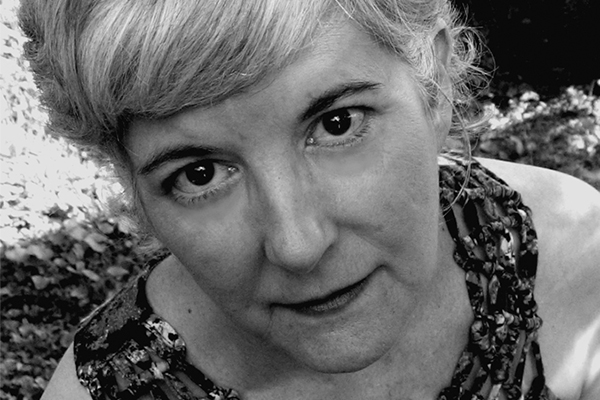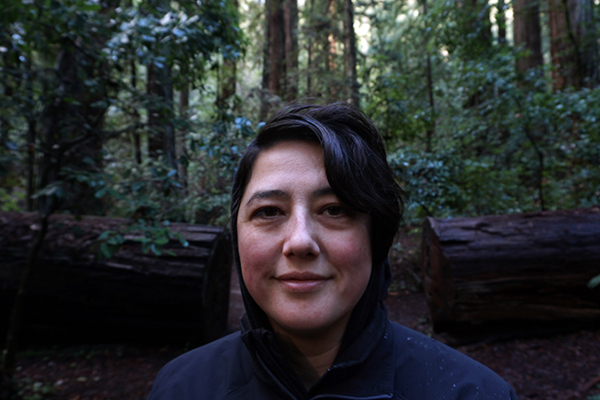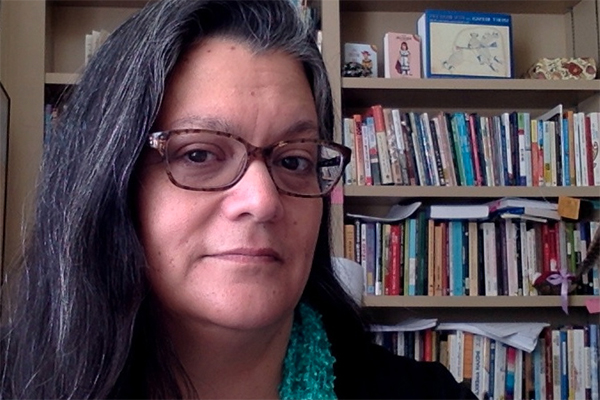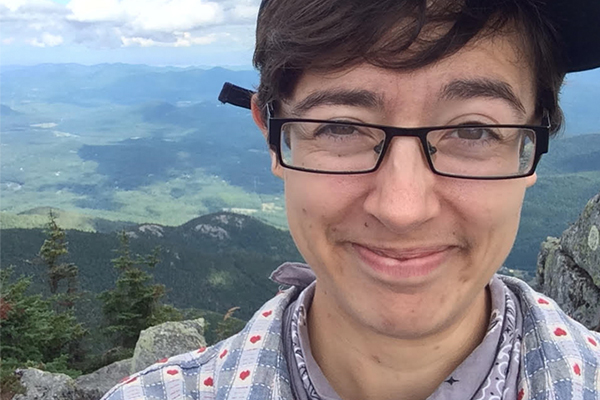
New Poetry by Queer Indigenous Women
A Series Curated by Natalie Diaz
In my Mojave culture, many of our songs are maps, but not in the sense of an American map. Mojave song-maps do not draw borders or boundaries, do not say this is knowable, or defined, or mine. Instead our maps use language to tell about our movements and wonderings (not wanderings) across a space, naming what has happened along the way while also compelling us toward what is waiting to be discovered, where we might go and who we might meet or become along the way.
This feature of indigenous women is meant to be like those song-maps, to offer myriad ways of “poetic” and linguistic experience—a journey through or across memory, or imagination, across pain or joy or the impossibility of each, across our bodies of land and water and flesh and ink—an ever-shifting, ever-returning, ever-realizing map of movement, of discovery, of possibility, of risk—of indigenous and native poetry. It is my luck to welcome you to this indigenous space and invite you into the conversations of these poems, languages, imageries and wonders. In the first installment of this bi-monthly feature, I’m pleased to share the work of Noʻu Revilla, Janet McAdams, Lehua M. Taitano, Deborah A. Miranda, and Arianne True (full bios below).
–‘Ahotk, Natalie Diaz
*
No’u Revilla
Memory as Missionary Position
Inside the dress, there is a creature, she
careful
is a cliff in a girl’s body.
And the cliff was a lizard once still turned
to rock she gazed too much like she
careful
had a kingdom inside.
Inside the dress, holes are cut
so the cliff can breathe and
any girl watching
any girl waiting
any glint of a girl’s
mother’s metal scissors can still find her –
careful
there are still pins inside.
To fit a lizard, the jaw of this dress unlocks.
Fitting sounds like eating and mothers
tell their daughter to shut their eyes
pins inside the unmarried
pins to decorate
the insides of a church.
Girls wear dresses that mothers sew for them.
this dress // shroud // napkin // flag
In the 1800s my greatgreatgreatgreatgreat grand
mothers swam to ships
to trade sex for cloth, iron, and mirrors.
A body for a body.
Did you see yourself in their glass, mother?
Did you cut the shape of your body
and send it whistling through the ocean?
when a cliff becomes altar
and the Pacific
in the name of civilization
is properly dressed
daughters inside
pine away
the altitude of faith.
After She Leaves You, Femme
1. you will be a hole in the ground.
a crater without glory,
without science. in the ground
you will forget we are the ones
whose legs double as thunder.
2. tell me where it hurts, no one will say.
leave land. leave sleep.
walk to the ocean
like your grandmother did
when grandpa died.
“she just kept walking,” aunty tells you.
“no mo’ slippa, not looking at anybody.”
3. read nayyirah waheed every night.
4. piling our legs like kiawe.
let it be this skin, this form. if something has to burn.
red flags we cackled and cut into skirts.
maybe we are passage to the divine.
and maybe we fuck ourselves in the shower
& rub storm clouds alive.
5. wash your sheets don’t wash your sheets
6. in seven days, she destroyed your world.
for the next seven, eat with your fingers
& trust only the moon.
there will be pressure-cooked pork.
there will be gauze.
7. remember the smell of ocean.
remember bare feet.
Janet McAdams
Pulse
It isn’t over in the after you could be
anything a horse a red pepper heating up
in the sun of the garden or be
A dust mote floating wanton
into an eye that will not water that mistakes
sadness for irritation
O be the edge of winter corruscating
the ibis moving north
Be the fuel carried in a red tin can
The lace that leaves come down to
rained on by engines by the motors
that run us that run us down
Little Bones
A birch sheds its bark and we read the list
of lost rules: what
to sort for, what
could stay, and why the light
laddered the long walk down to water.
We catalogued that land to make it ours.
Wrote down the trees, the kinds of trees,
their heights, their girths, what winters
they had lived through:
Maple Leaning East
Oak with 9 Branches
Pine Tree Bored by Beetles
We’ll crawl out of this, you said, study
how to be human.
I left a finger at every crossing
and scattered teeth like pebbles–
anything to point you the way
you said you needed to go. I never
looked back. I knew the curse of it.
I used a shoulder for the first buoy,
and anchored it with a braid of hair.
I set my left eye high
in the north sky,
gathered my skin to net one last
hunger, to offer you
a meal of cracked shells for sucking
and hoisted up my mast of spine
until the wind filled a sail
stitched from eyelash, from the viscera
that surrounds the heart
and you sailed on—
the sea was that calm—
to that other country
and how you kept
a knuckle or a nipple
to remember—
long lost in the hot
happiness of that other nation
and unremembered
as the air that once filled a lung
the faint salt of someone’s skin
a flavor, then gone, like anything
ever eaten.
Lehua M. Taitano
Low Mountain Lake Song
Summer’s hem. The moon, a swelling. Too, bullfrog throats, vibrating across the slick green bay. Full low like a plump lip jug pressing. At night, this side of things is settled without the memory of ache. Even the shallows are pregnant. Slow fish, the terrapin’s slide. In the trees, a ladder to nowhere. A fire for the color of it, the air warmer than smoke. A cupping, an ease, a drifting you want to pocket.
Past midnight, the crescent of green water holds, tongue warm. The boat green, the shore grass green. Flute green the swamp reeds. Green the unseen frogs, the firefly pulse. Beneath the mouth of a moonbright sky, sway. Spilt green, the moment before a song. A song, green, silt green in the lungs.
Come Sit Around This Stone
The International Hotel, Manilatown, San Francisco, April 21, 2016
for Aimee, Angela, Arlene, Barbara Jane, Javier, and Urayoán
Kuwentuhan! Kuwentuhan!
What stories on the corner
of Jackson
which exhumes Tubman, strata,
press of time
beneath sidewalks stained today
with piss, yesterday’s blood. Batons
polished, bullets, helmets, the same
backdrop,
the burst
on loop on loop on loop:
I only want to see you
Across, the House of Nanking, a man in khaki head-
to- toe
scooping paper and
soggy pigeon mess.
East/West Bank.
I only want to see you on loop on loop on loop:
49 mile scenic drive
LED man housed in a box, mid-stride
crossing,
See you standing
super imposed orange ticking
countdown to Kearny.
Exhume this brickscape,
the signs are flashing move move move.
I only want to see you
Police crusade on horseback,
beating stick a
casual caress and the horse’s
eye, stuttering.
See you laughing
Leaflets newsprint scrawl spitting rain khaki man
bends to
a parcel and we
were talking of Tubman.
Will her face imprint on any policy
more than a sheaf.
On loop on loop: purple
the corner of Jackson 10,000 carabaos, a newer
version
laughing
of the same old dark
the brick canvas exhumed, a rifle
thrusts up through asphalt pooled with rain-diluted
urine.
God
damnit.
God damnit.
purple, purple, purple, purple, purple, purple, purple
At eight- forty -eight International,
a corner enfolding
tableau:
this bed frame of brown poetas, the thrum of
the
unearthed ( here Harriet’s rifle juts
up from beneath the sheets).
Here, the Bay Shore Fish Wharf, Great Saigon
move move move
I only want to see you
quickly, Kobe Bento, move!
laughing in the
Nightstick slick with
rain.
Deborah A. Miranda
Palimpsest
A manuscript or piece of writing material on which the original writing
has been effaced to make room for later writing but of which traces remain.
How does obsidian forget the hiss of magma?
How does water forget the cloud of its birth?
Can wild iris forget the dark belly of the bulb?
Does scar forget the torn, raw edge of flesh?
Hands that reached inside chaos, brought me out into the world.
Mouth that breathed into mine a language wild enough to wake me.
When does fire forget lightning? Should canyon forget river?
Might skin renounce fingerprint? Will honey deny the bee?
Don’t ask me to forget. Don’t tell me this is over.
Beneath sand and broken mountains,
even the Mojave remembers salt of a fickle sea.
Love in the Margins
Come on, shapeshifter—
I can’t dance either.
But I want to hold
your shadowy body,
hum crooked tunes
into your abalone ear.
Out here on the edge,
desperadas don’t always
make good lovers.
Sometimes our scars
match too well; touch
is barbed wire and border.
I’ll try not to hide behind
my bruises if you’ll
give me the hard gray line
of your shoulder.
Can’t you hear
the cricket’s ebbing
daysong? Let me
tuck that tidal melody
into the wine-colored
strands of your hair,
braid your name
with horizon’s indigo
kiss. Glorious outlaws,
we’ve got nothing to lose
but this edge.
When You Forget Me
with thanks to Pablo Neruda
the past is a poor broken basket,
woven by hands that had no muscle, no song.
When you forget me, every word we spoke together
just before or after slow first light, lips still wet,
– doe, heron, stone, prayer – erases itself
from every language, as if never spoken. Extinct.
When you forget me, dream of other women,
offer them the dance of your heart, recline
in a meadow, drink red wine, seek another woman’s
blush, what basket could hold all this desire?
I’ll gather black maidenhair fern stems, redbud,
bear grass from our sacred places; I’ll harvest,
split and dry each piece. My busy hands
won’t miss the obsidian outline of your face.
When you forget me, that river where we first kissed
won’t stop flowing down from mountains older
than desire; when you forget me, the forest that cradled
our creation won’t burn down. Some things last.
I’ll remember what they are, one by one, as I dye
my bundles, start the coil, fit weft around stave.
I’ll remember how to make a life out of fragments,
how to splice so skillfully, no visible break remains.
Arianne True
this story doesn’t end in the unobscured
Cato shakes me gently among
the full floor bodies companionable
room a drowse hung with breath
shaky hands morning blotted blonde
birds open slowly their coats
before the sun can throat a sky
a curling shaft of bird calls
waves to the salt line
it is little past four
in the morning
tracking baretopped feet on the blacktop paved
calflines drag up islands currents pull both sides of shore
sand evaporated, wood washed white, wrong side of the ocean
and Cato
like mouse like stoat like fennec unfurling
her shirt against the mist her
paleness a bull against the churned sea
her body distilled salt porous, lit
I look back at the dogs of the beach
suppose them
the furious hounds of something
arms spilt light, ailing tang
toward her crystal gleam and ache
the flush of cold spills into ships
my sunk hips at the long mouth
of a balloon
the sun chilled and rosy
breathes fast, hard,
the aftermath of what
I
is it raining ash there?
it’s raining ash here.
bits of mountainside catch
in the window mesh
sap holds ash to oak leaves
all light red
shadows, red
red holes in shadows
ash so pale in all that ::
the whole street lit as if by ::
the volcanoes :: south
hold quiet
in the aftermath of what
exactly
II
who knew mountains could burn
a range ablaze
my lover sweats out
a fever in the living room
the wind coughs through window screens
soot collects the sill grey
the grass sleeps yellow
overhued and oblivious
III
ash films spider webs
when you mourn
where does it go
![]()
Noʻu Revilla is a queer Indigenous poet and educator of Hawaiian and Tahitian descent. Born and raised on the island of Maui, she has performed and facilitated creative writing workshops throughout Hawaiʻi as well as in Canada, Papua New Guinea, and at the United Nations. Her work has been exhibited at the Honolulu Museum of Art and appears in Poetry magazine, Black Renaissance Noire, The Missing Slate, Hawaiʻi Review, and Poem of the Week by Kore Press. Her chapbook Say Throne was published by Tinfish Press in 2011, and she is currently finishing her PhD in creative writing at the University of Hawaiʻi-Mānoa.
Janet McAdams is the author of three poetry collections, most recently the chapbook Seven Boxes for the Country After. With Geary Hobson and Kathryn Walkiewicz, she coedited the anthology The People Who Stayed: Southeastern Indian Writing after Removal. A writer of mixed Scottish, Irish, and Creek (Muscogee) ancestry, she grew up in Alabama and now lives in Ohio, where she teaches at Kenyon College.
Lehua M. Taitano, a native Chamoru from Yigo, Guåhan (Guam), is a queer writer and interdisciplinary artist. She is the author of two volumes of poetry–Inside Me an Island (forthcoming 2018) and A Bell Made of Stones. Her chapbook, appalachiapacific, won the 2010 Merriam-Frontier Award for short fiction, and her most recent chapbook, Sonoma, was published by Dropleaf Press in 2017. She hustles her way through the capitalist labyrinth as a bike mechanic who sometimes gets paid to make art.
Deborah A. Miranda is the author of Bad Indians: A Tribal Memoir (winner of the PEN Oakland Josephine Miles Literary Award), as well as three poetry collections, Indian Cartography, The Zen of La Llorona, and Raised By Humans. She is co-editor of Sovereign Erotics: An Anthology of Two-Spirit Literature and her collection of essays, The Hidden Stories of Isabel Meadows and Other California Indian Lacunae is under contract with U of Nebraska Press. Miranda is an enrolled member of the Ohlone-Costanoan Esselen Nation of California. As John Lucian Smith Jr. Professor of English at Washington and Lee University, Deborah teaches Creative Writing (poetry and memoir), composition, and literature of the margins (Native American, Chicana/o, LGBTQ, African American, Asian American, mixed-genre, experimental).
Arianne True (Choctaw, Chickasaw) is a queer poet and folk artist who has worked everywhere from the temperate rainforest canopy to the rocky edges of the Salish Sea. Arianne has taught and mentored with Writers in the Schools (WITS), YouthSpeaks Seattle, and the Richard Hugo House, and has served as a guest editor for cloudthroat. In May, Arianne will graduate from the MFA program at the Institute of American Indian Arts.

















